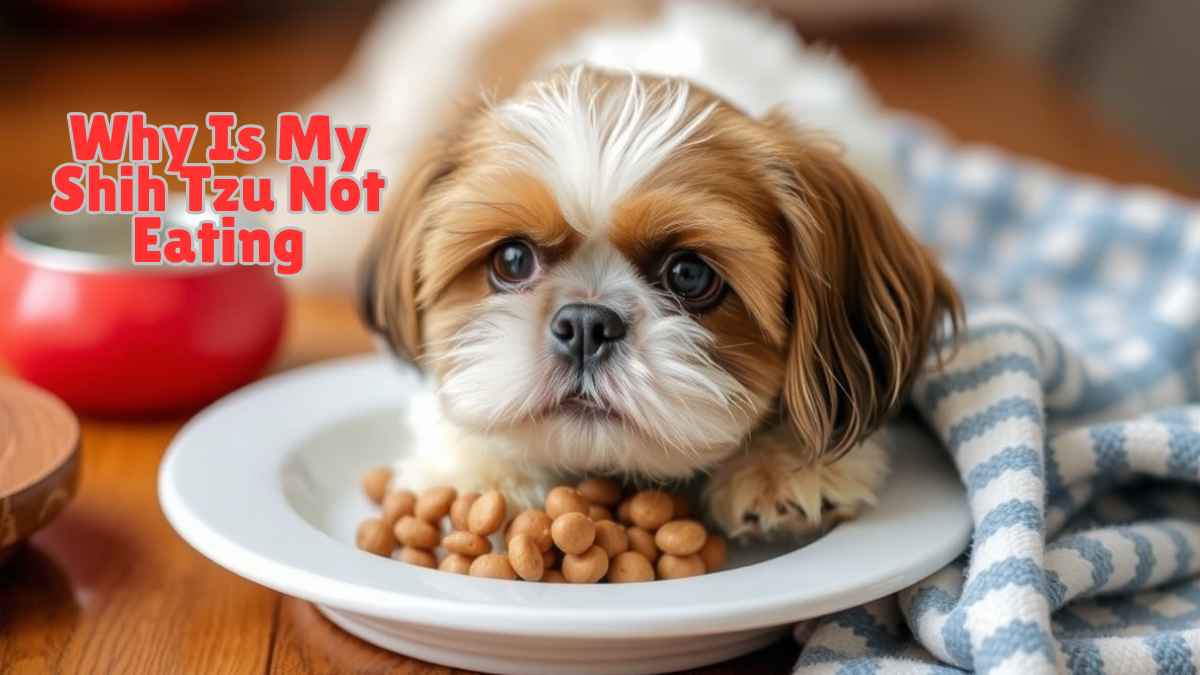Why Is My Shih Tzu Not Eating? Causes and What to Do

A Shih Tzu’s refusal to eat may seem minor, but it can signal that something deeper is going on. Understanding the reasons behind your dog’s loss of appetite and knowing what steps to take could make all the difference in their well-being.
What Is “Shih Tzu Not Eating”?
“Shih Tzu not eating” refers to a noticeable decline in food consumption by your dog, either by skipping meals entirely or eating significantly less than usual. It can be a passing phase or an ongoing concern. While Shih Tzus are known for their picky nature, a persistent refusal to eat isn’t just fussiness—it can point to underlying physical or emotional issues.
Shih Tzus are small in size, and even a day or two of not eating can lead to weakness, hypoglycemia, or digestive discomfort. This is why early recognition and intervention are critical.
Is It Normal for a Shih Tzu to Skip Meals?
It can be somewhat normal for Shih Tzus to occasionally skip a meal, especially if they’ve had too many treats or are feeling a little off for the day. They may also eat less in hot weather or after moderate activity. But when meal-skipping turns into a pattern, that’s when it becomes a red flag.
Healthy dogs rarely miss more than one meal without a reason. And because Shih Tzus have small stomachs and high metabolism, any change in eating behavior should be closely monitored.
Dental Problems or Oral Pain
Dental health is often overlooked, but it’s one of the most common reasons a Shih Tzu might stop eating. This breed is highly prone to gum disease, tooth decay, and tartar build-up, all of which can make chewing painful.
If your dog turns away from food, especially hard kibble, or drools more than usual, gently check their mouth. Bad breath, inflamed gums, or loose teeth are all warning signs. A vet dental check-up and switching to soft food may offer quick relief.
Stress or Emotional Changes
Shih Tzus are emotionally sensitive dogs. If something feels off in their environment, like a change in household routine, loud noises, or the absence of a family member, they may refuse to eat.
Dogs, especially this breed, are creatures of comfort. Even moving their feeding area can make them anxious. Signs of stress alongside appetite loss include hiding, excessive sleeping, or following you around nervously.
Illness or Underlying Medical Conditions
Loss of appetite is often one of the first signs of illness in dogs. This could range from a minor upset stomach to more serious issues like pancreatitis, kidney problems, or infections.
If your Shih Tzu is not eating and also showing symptoms like vomiting, diarrhea, or lethargy, a veterinary visit is essential. Bloodwork or imaging may be needed to identify the issue, and early intervention is always the safer route.
Diet Boredom or Dislike
Yes, Shih Tzus can be dramatic about food. If they’re fed the same kibble day in and day out, they may simply lose interest. You might also notice they prefer certain textures or flavors and ignore others.
This can be solved by adding natural food toppers like plain chicken or rotating protein flavors. Just ensure you introduce new foods gradually and avoid spicy or processed human foods.
Changes in Environment or Routine
Even a slight change in routine can throw off your dog’s appetite. New pets, guests, traveling, or shifting meal times can lead to eating refusal.
Shih Tzus thrive on routine. Try feeding at the same times daily, in the same place, and with minimal distractions. Re-establishing consistency can often bring their appetite back on track.
Age-Related Factors
As Shih Tzus age, they may naturally slow down, and their metabolism and sense of taste may diminish. Senior dogs often experience joint pain, digestive changes, or dental decline, all of which affect eating.
Older Shih Tzus may benefit from softer foods, warm meals, and more frequent but smaller feedings. Monitoring their weight and energy levels is key to early detection of age-related conditions.
Side Effects from Medication or Vaccines
Sometimes, medications—especially antibiotics or anti-inflammatory drugs—can temporarily reduce appetite. Similarly, some dogs react to vaccinations with mild discomfort or nausea, leading to skipped meals.
If your Shih Tzu stops eating right after medical treatment but seems otherwise okay, observe for a day. If symptoms persist, call your vet for advice.
Hot Weather and Seasonal Shifts
Heat has a significant impact on your dog’s appetite. In hot or humid weather, it’s common for Shih Tzus to eat less than usual, especially if they’re not very active.
Ensure they stay hydrated, and feed them in a cool, shaded area. Wet food or ice-cold treats can help stimulate interest in meals during warmer months.
When Is It a Serious Problem?
While missing one meal might not be alarming, a Shih Tzu that refuses to eat for more than 24–48 hours needs medical attention, especially puppies or older dogs.
Immediate vet care is needed if the loss of appetite is accompanied by:
-
Vomiting or diarrhea
-
Lethargy or confusion
-
Labored breathing
-
Dehydration (dry gums, sunken eyes)
Shih Tzus have delicate systems, and early diagnosis can prevent bigger problems down the line.
Step-by-Step Troubleshooting Checklist
-
Inspect their mouth for dental pain or ulcers.
-
Check stool and vomit for irregularities.
-
Monitor energy levels and alertness.
-
Switch to a more palatable food and warm it slightly.
-
Feed in a quiet space free from stress.
-
Avoid overfeeding treats, which can ruin their appetite.
-
Ensure hydration—a dog not drinking and not eating is an emergency.
If none of these steps work, a vet consultation is the next best step.
Try Adjusting the Food
Some dogs just need their meals made more appealing. Adding warm water or low-sodium chicken broth to kibble can enhance aroma and encourage eating.
Experiment with texture (soft vs. crunchy) and temperature. Dogs, like humans, can be very specific in what appeals to them.
Create a Comfortable Feeding Environment
Stress-free eating is crucial. Avoid placing their bowl near loud appliances or in high-traffic areas. Ensure they have a peaceful, safe zone to eat without being rushed or disturbed.
If you’ve recently moved or changed feeding locations, try moving back to their familiar spot.
Limit Treats and Table Scraps
Too many treats or people food can spoil your dog’s appetite for real meals. Shih Tzus are small, and even a handful of treats can make them feel full.
Establish clear boundaries and avoid feeding from the table. Your dog will learn that meals are the main source of nutrition—not snacks.
Encourage
Eating
Through Play or Exercise
Sometimes a bit of physical activity stimulates hunger. A short walk, play session, or even light training can awaken their appetite.
Interactive feeders or food puzzles also turn eating into a rewarding challenge, making the process more engaging.
Home Remedies and Temporary Fixes
In mild cases, natural solutions can help. These include:
-
Boiled chicken and rice (bland and easy to digest)
-
Bone broth (nutritious and enticing)
-
Baby food (check ingredients; should be pure meat, no onion/garlic)
These should only be short-term solutions and not a replacement for regular dog food.
How Vets Diagnose Loss of Appetite
When you visit a vet for appetite loss, they’ll perform:
-
A physical exam, checking gums, abdomen, and temperature
-
Blood tests to look for infections or organ problems
-
X-rays or ultrasounds, if needed
-
Reviewing current medications and behavioral history
This thorough approach helps pinpoint the exact cause, ensuring the right treatment plan.
Tips to Prevent Future Eating Problems
-
Stick to a routine feeding schedule
-
Choose high-quality food made for your dog’s life stage
-
Regular dental cleanings and health checkups
-
Avoid giving in to picky behavior too quickly
-
Make mealtime a calm, predictable experience
These proactive habits can prevent food refusal from becoming a recurring issue.
Conclusion
When your Shih Tzu isn’t eating, it’s not something to take lightly. It might be a temporary behavior, or a sign of something that requires professional care. The key is to stay calm, observe closely, and take meaningful action.
With early attention, a little patience, and some creativity, you can help your pup get back to enjoying their meals and living happily by your side.
Take action early, help your Shih Tzu eat happily and stay healthy!




